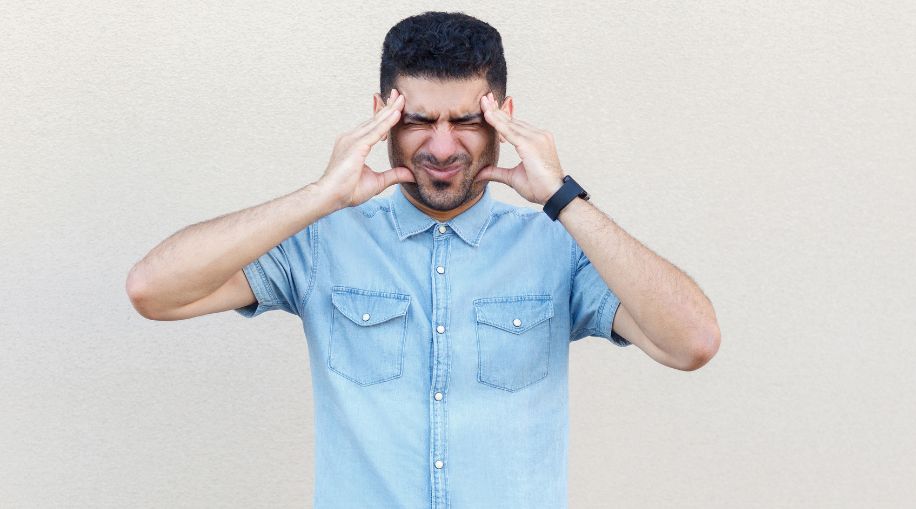Treatments for Migraines
While migraines can be tough, many treatments can help you feel better, like Advil, an anti-inflammatory medication that may help relieve pain of migraines.
1. Lifestyle Changes
Making changes to your daily routine can help prevent migraines. Here are some helpful tips:
- Regular sleep: Try to go to bed and wake up at the same time each day.
- Healthy eating: Eating balanced meals and avoiding foods that trigger migraines can make a difference. Keep track of what you eat to find out what might cause your headaches.
- Stay hydrated: Drink plenty of water to prevent dehydration, which can lead to migraines.
- Manage stress: Activities like yoga, meditation or deep breathing can help reduce stress, which is a common trigger for migraines.
2. Over-the-Counter Pain Relievers
For mild migraine pain, over-the-counter (OTC) medications can be helpful. Some common options include:
- Advil: Advil helps reduce pain and swelling of migraines.
- Aspirin: Eases headache pain.
- Acetaminophen: Helps relieve pain but doesn’t reduce swelling.
It’s important not to take these medications too often, as they can cause rebound headaches, which come back after the medicine wears off.
3. Prescription Medications
If OTC medications don’t work, doctors can prescribe stronger medications. Some common types include:
- Triptans: These medications are made specifically for migraines and help narrow blood vessels to relieve pain. Sumatriptan and rizatriptan are popular examples.
- Ergotamine: This drug can be taken with caffeine and works best if taken early during a migraine attack.
- Lasmitidan: A newer option that helps reduce pain without tightening blood vessels.
4. Preventive Medications
For people who have frequent migraines, doctors may recommend medications that help prevent them. Some preventive treatments include:
- Blood pressure medications: Certain drugs used for high blood pressure can also help reduce the frequency of migraines.
- Antidepressants: Medications like amitriptyline may help prevent migraines, even in people who do not have depression.
- Anti-seizure medications: Drugs like topiramate can be effective in reducing migraine attacks.
These medications are taken daily to help prevent migraines rather than to stop them once they start.
5. CGRP Inhibitors
CGRP inhibitors are a newer class of medication that helps block a protein involved in migraine attacks. Some examples include:
- Erenumab.
- Fremanezumab.
- Galcanezumab.
These medications are usually given as a monthly injection and can help reduce the number of migraines for people who have not found success with other treatments.
6. Botox Injections
Botox can be helpful for people with chronic migraines (more than 15 headache days a month). In this treatment, Botox is injected into specific areas of the head and neck. This helps reduce the frequency of migraines by relaxing muscles and blocking pain signals. Botox treatments are typically done every 3 months.
7. Alternative Treatments
Some people find relief with alternative treatments, which can be used alongside other medications:
- Acupuncture: This involves placing tiny needles at certain points on the body and may help reduce the number of migraines.
- Massage therapy: Massaging the neck and shoulders can help relieve tension that might cause migraines.
- Herbal supplements: Some people benefit from supplements like magnesium, riboflavin (vitamin B2) or feverfew. Always talk to a doctor before trying new supplements.
8. Cold Compress
Applying a cold pack to your forehead or the back of your neck can help ease migraine pain. Cold therapy can help numb the area and reduce inflammation, giving you some relief.
Signs and Symptoms of Migraines
Migraines often come with different symptoms that can vary from person to person. Here are some common signs:
- Sensitivity to light and sound.
- Seeing flashes of light or having an “aura" (a visual disturbance) before the headache starts.
- Dizziness or blurred vision.
- Throbbing or pulsing headache usually on one side of the head.
- Feeling sick or vomiting.
Battling Migraines
Migraines can be challenging, but there are many ways to find relief. If you think you have migraines, it’s important to talk to a doctor about the best treatment options for you. With the right plan, many people can reduce the number and intensity of their migraines.
If you're suffering from erectile dysfunction, there are some treatments that can help.
